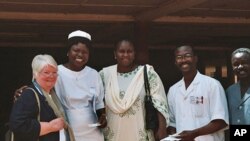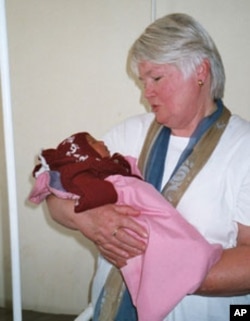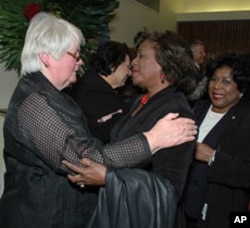At first glance, Jill Sheffield seems to be all business as she meets with staff members to plan an upcoming Women Deliver conference. About 3,000 government leaders, women's health care workers, researchers and journalists are expected to attend.
Sheffield is the founder of Women Deliver and Family Care International, two New York-based nonprofit organizations dedicated to improving reproductive and maternal health for women around the world.
"I feel really strongly about the fact that women have rights like other people," she says, "and that they shouldn't die early in their life, giving life."
Connecting maternal health and international development
Sheffield first discovered the profound connection between maternal health and international development in 1964. She was accompanying her husband on a nine-nation tour of Africa as he researched strategies for U.S. government aid for education.
"The men were in the offices in suits," she recalls. "But it was the women who were out doing things — being the teachers, being the workers in the field, being the nurses — all the while they were also mothers. Women are the ultimate multi-taskers."
Click to Listen:
Jill Sheffield was born in 1939 to liberal parents in a small, racially segregated town in central Florida. She says her mother, a 5th grade teacher, was her most important influence.
"My mother loved teaching. She just opened doors for peoples' minds and ears and eyes, and to this day, I believe deeply that education is the silver bullet to development to poverty reduction [and] women's empowerment."
Reproductive choice
Sheffield says her belief in the importance of education and its link to development is closely allied to her commitment to reproductive choice. "Women need to have choices about the number and the spacing of their children. I am sure of that."
While her husband continued his research on educational development in Africa, Sheffield volunteered at a Nairobi, Kenya family planning clinic. She vividly recalls the day a 27-year-old woman came in holding a baby and carrying another baby on her back. She had been pregnant eleven times and wanted contraceptives. Sheffield was also 27 at the time.
"And I kept thinking 'Holy smokes. You haven't had 11 pregnancies, [only because] you've had the choice.' Right at that moment I decided women had to have those choices."
When Sheffield and her husband returned to the United States three years later, she started developing global health and education programs for nonprofit organizations. In 1982, she became director for international education programs at the Carnegie Corporation of New York.
Turning Point
The next turning point in her life came in 1985, she says, at a global conference in Nairobi capping off the United Nations Decade for Women. Sheffield heard a doctor with the World Health Organization estimate that every minute a woman somewhere on the planet dies from a complication related to pregnancy or childbirth. The doctor challenged her listeners to find out why. "And I decided absolutely that's what we have to do." she says.
Sheffield immediately sent a telegram to David Hamburg, the president of the foundation, requesting a meeting. She told him "if we're making this huge investment in education programs around the world, and the women then die, that's not a great investment.'"
The next year, Sheffield left Carnegie to start Family Care International, or FCI. Her mission was immense: to identify the causes of maternal death worldwide and to teach governments, non-governmental organizations, and researchers how and why they should prevent it. FCI began its work with a conference attended by about 170 people, including government ministers, researchers and people from global institutions like the World Bank, UNICEF, the UN Population Fund and the WHO.
The results, Sheffield says, have been gratifying. Within ten years, FCI created a working model to save women's lives in low resource communities in Kenya, Tanzania and Burkina Faso. It has also been responsible for scores of clinics elsewhere in Africa, Asia and Latin America.
To further the cause of women's health, Sheffield founded Women Deliver in 2007. The two organizations are closely allied and share office space. Women Deliver's mission is to generate the political will and financial support for reducing maternal mortality and providing universal access to reproductive health care. That's one of the 10 Millennium Development Goals the UN is committed to achieving by 2015.
Through advocacy, education and networking, Jill Sheffield is delivering the message that maternal health is both a human right and a necessity for every nation's sustainable development.







